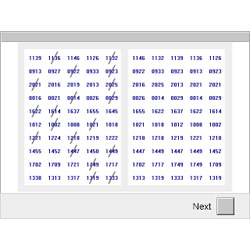
Differential and Attention Test - DAKT - 1 Year License
Model 64095
Primarily intended for personnel selection, career counseling, diagnosis and assessment. Additional areas of use are traffic psychology (especially railway and aviation psychology), military psychology, as well as within clinical settings.
Test Overview
The DAKT enables the reliable and valid measurement of "Perceptual speed" and "Accuracy / Resistance to error" as basic elements of attention. Moreover, the test is suitable for the diagnosis of perceptual disorders, e.g. dyslexia.
Main Areas of Application
- Performance-oriented aptitude diagnostics
- Organizational industrial psychology
- Counseling regarding college and career
Theoretical Background
The DAKT measures Perceptual speed, defined as the capacity to recognize details rapidly in a distracting perceptual environment and to differentiate them from irrelevant material, and Accuracy, defined as the relation between the number of errors and the quantitative performance (error-percentage).
Research on mental ability using factor-analysis, has unambiguously identified a perceptual factor which involves a major component of speed. The DAKT represents this factor, referred to as Perceptual Speed (P) in the psychological literature.
Administration
The DAKT consists of three subtests differing in content (Numbers, Letters, and Figures). The task is to identify and mark critical items as fast and accurately as possible.
Test Forms
There are two parallel test forms: S1 and S2. It is possible to administer each of the subtests separately.
Scoring
The number of correctly solved items constitutes the score for Perceptual Speed; the relation between errors and completed items constitutes the sore for Accuracy. The printout shows raw- and standard-scores for each subtest and for the total performance.
Reliability
The parallel-test reliability coefficients are r = 0.96 for Perceptual Speed and r = 0.84 for Accuracy.
Validity
The face validity is evident – the respondents think immediately of "fast and accurate checking / attention and concentration". The logical validity is given by the operational definition of Perceptual Speed and Accuracy. Content validity has been proven through factor analysis. Prognostic validity has been demonstrated for occupations demanding, amongst other prerequisites, a high degree of perceptual speed and accuracy. Criteria used were "completed occupational education without complications" and "poor performance on the job".
Norms
For both test forms norms of an Austrian norm sample of N=436 persons as well as a Swedish norm sample of N=1120 are available. Both norm samples are available broken down by age. Statistically the overall Austrian norms do not differ from the overall Swedish norms, hence the samples can be regarded as parallel.
Testing Time
The testing time for each subtest is three minutes. Add approximately four minutes for instructions and solving the practice items.
VTS System Overview
The Schuhfried VTS enables computer-assisted application of a large number of highly diverse psycho-diagnostic tests and measuring procedures. In developing the system much emphasis was placed on transparent structure and largely uniform design. It is therefore simple to operate and easy to understand and does not require any special computer skills.
The VTS basic module is required for administration of any of the available tests.
The Schuhfried VTS supports the administration of both single tests and test batteries. Many of the single tests are available in different test versions. These test versions may differ, for example, in terms of test duration or difficulty or may be parallel forms. They are characterized by different parameters reflecting specific test requirements. They have been designed for administration to a specific population (e.g. psychiatric patients, children, etc.) or for special measuring purposes (e.g. repeated measurements). Test batteries are compiled from the available single tests and test versions.
